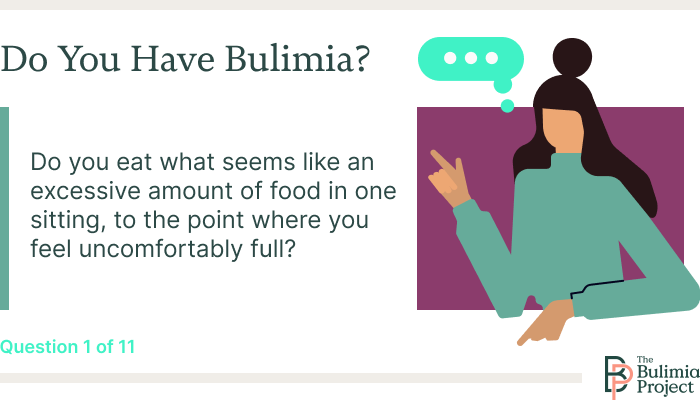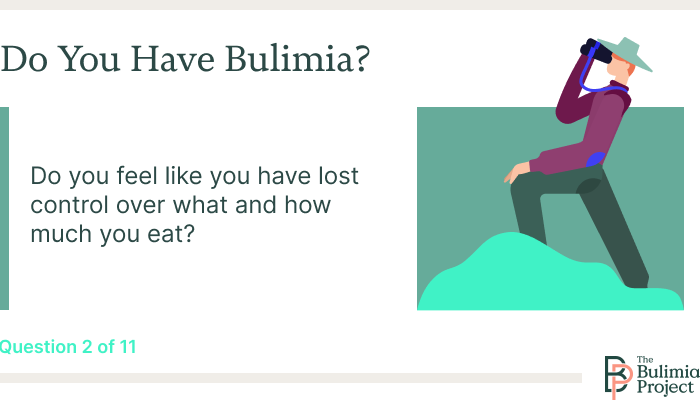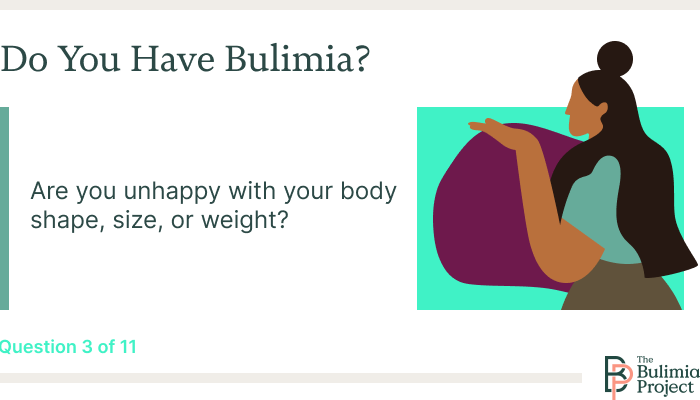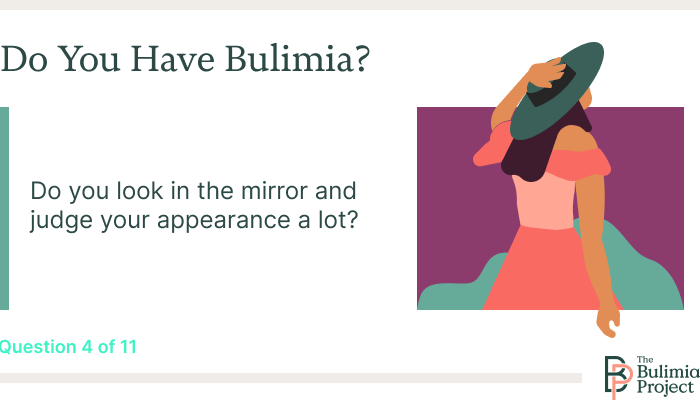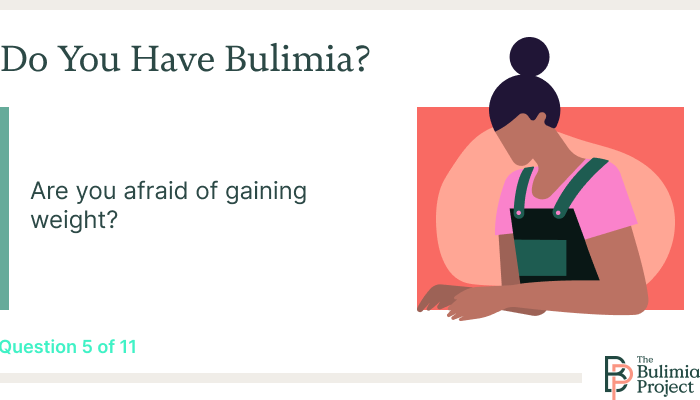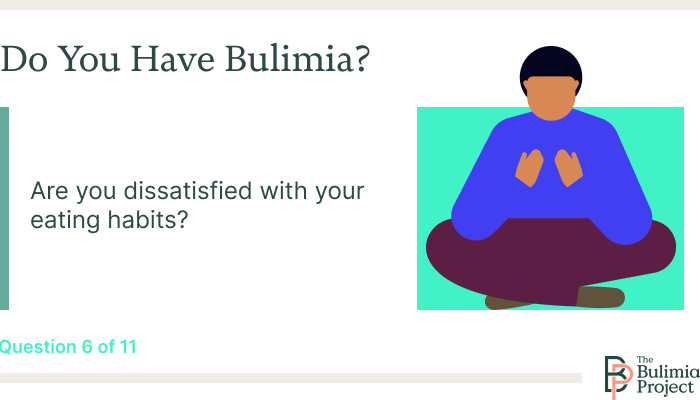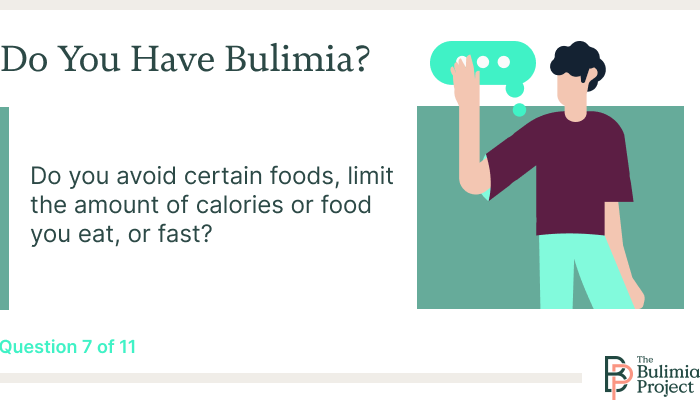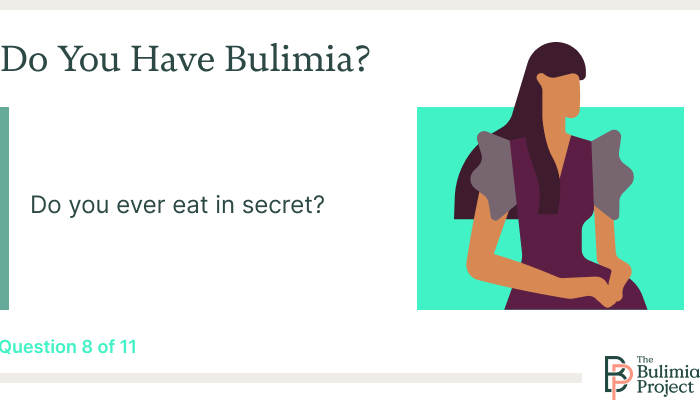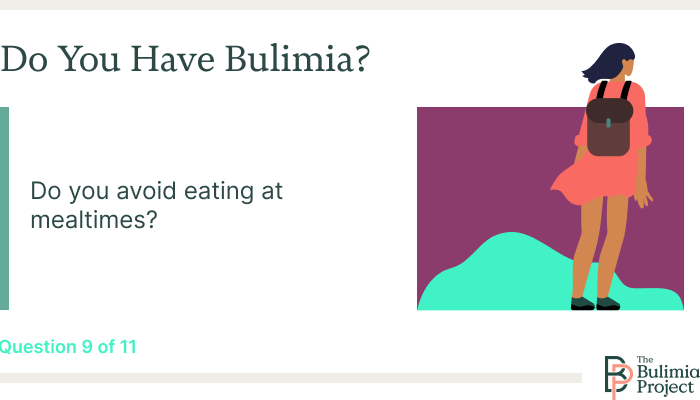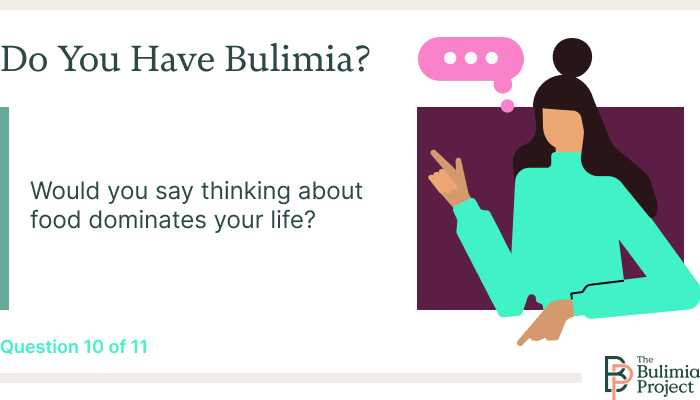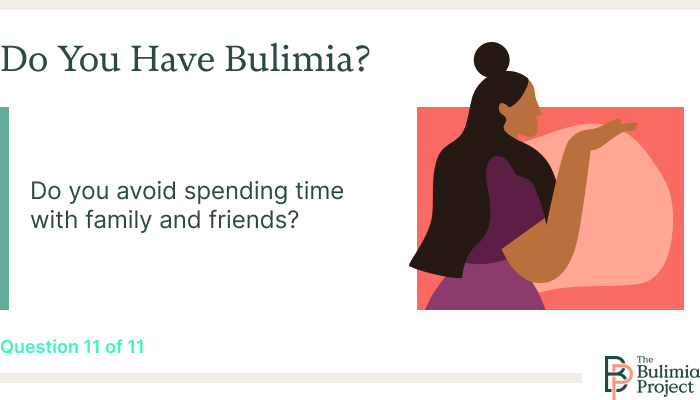Not everyone will experience all the signs and symptoms of bulimia nervosa (BN), and you don’t need to have all the criteria for BN to be suffering from the eating disorder. Individuals can experience bulimia differently.
Self-Assessment Eating Disorder Quiz
If you feel like you might have bulimia, ask yourself the following question (5):
- Do you force yourself to vomit, exercise excessively, or use laxatives or diuretics to compensate for your eating?
While the above behaviors are characteristic of bulimia specifically, there are also other behaviors that bulimia has in common with other eating disorders. Ask the following questions:
- Do you eat what seems like an excessive amount of food in one sitting, to the point where you feel uncomfortably full?
- Do you feel like you have lost control over what and how much you eat?
- Are you unhappy with your body shape, size, or weight?
- Do you look in the mirror and judge your appearance a lot?
- Are you afraid of gaining weight?
- Are you dissatisfied with your eating habits?
- Do you avoid certain foods, limit the amount of calories or food you eat, or fast?
- Do you ever eat in secret?
- Do you avoid eating at mealtimes?
- Would you say thinking about food dominates your life?
- Do you avoid spending time with family and friends?
If you answer yes to one or more these questions, you may be demonstrating disordered eating thoughts, or are suffering from bulimia. Of course, this self-assessment should not be taken as a diagnosis for bulimia nervosa. Rather, it may be an indicator that it’s time to talk to someone about what you’re feeling, whether a trusted family member or healthcare professional.
If you struggle with binging, purging behaviors, and negative self-image, you might be wondering if you have bulimia nervosa. Keep reading to learn more about the signs and symptoms of bulimia nervosa, the consequences of not addressing the disorder, as well as a self-assessment quiz to help you determine if you should seek help immediately.
Diagnostic Criteria for Bulimia Nervosa
If you don’t know much about bulimia, you might think the only criteria to meet a positive diagnosis for the disorder are binging and purging, but there is more to it than that. According to the DSM-5 (Diagnostic and Statistical Manual of Mental Disorders, Fifth Edition), the official diagnostic criteria for bulimia nervosa is as follows (2):
- Recurrent episodes of binge eating are characterized by eating a large amount of food in a short time and feeling a lack of control over eating during the episode.
- Recurrent purging or compensating behaviors to prevent weight gain, such as self-induced vomiting, excessive exercise, fasting, or use of laxatives and/or diuretics.
- The binging and purging behaviors both occur, on average, at least once a week over three months.
- How you perceive yourself is heavily influenced by your body shape, size, and weight.
- The disordered eating behaviors don’t occur only when you’re experiencing the symptoms of anorexia nervosa.
What are the Signs and Symptoms of Bulimia Nervosa?
Different eating disorders have many of the same signs and symptoms. Bulimia and binge eating disorder (BED) share many characteristics. What distinguishes bulimia from BED is engaging in what are called “compensatory behaviors” after binging on a large quantity of food to purge the calories consumed. These behaviors can present as vomiting, exercising excessively, or using laxatives or diuretics. People who have anorexia or bulimia may avoid certain foods, severely limit the amount of calories or food eaten. But, unlike people who have anorexia, those who have bulimia are usually not of lower weight.
The signs and symptoms of bulimia nervosa fall into three primary categories: Behavioral, psychological, and physical.
When a person develops bulimia, they struggle with the behaviors associated with the eating disorder but can also exhibit mood or anxiety disorder symptoms which commonly co-occur with bulimia nervosa. These include (2):
- Eating much larger than typical amounts of food in a single sitting i.e. binging
- Purging after binging episodes by self-induced vomiting,or using laxatives or diuretics
- Other compensatory behaviors like fasting or excessive exercise
- Frequent body checking or avoiding mirrors and looking at one’s body
- Secrecy, particularly around eating and hoarding food
- Development of food rituals, such as only eating a particular food or food group, excessive chewing, and not allowing foods to touch a plate
- Skipping meals, only eating small portions, or following new fad diets
- Uncomfortable eating around others and/or fear of eating in public
- Drinking excessive amounts of water or calorie-free beverages
- Wearing baggy clothing and avoiding activities that expose the body
- Mood swings and increasing irritability
Bulimia nervosa can also manifest with some noticeable psychological signs and symptoms that can have a significant impact on day-to-day life. They include (3):
- A preoccupation with food and an obsession with body size, shape, and weight
- Intense fear of gaining weight and a distorted perception of body shape and weight
- Feeling anxious or stressed, especially at meal times or when asked to eat with others
- Low confidence and low self-esteem
- Feeling a loss of control over eating
- Feelings of shame and guilt after binging and purging
- Co-occurring mental health disorders such as depression or anxiety
The physical signs and symptoms of bulimia nervosa are varied, with the severity of them depending on the severity of your bulimia behaviors. They include:
- There can be fluctuations in weight, both up and down. Bulimia nervosa occurs in people of all body sizes and many people who struggle with it are not at extremely low body weights because weight gain or loss isn’t a primary symptom of bulimia nervosa
- Stomach cramps and other non-specific gastrointestinal complaints, such as acid reflux, constipation, and diarrhea
- Cuts and calluses across the knuckles, which occur as a result of them rubbing against the teeth when self-inducing vomiting
- Dizziness and/or fainting
- Dental problems, such as tooth discoloration, tooth decay, gum disease, tooth sensitivity, and enamel erosion
- Dry skin
- Dry and brittle nails and hair
- Lanugo hair( the growth of fine and downy hair across the body)
- Swelling of the face around the area of the salivary glands
- Feeling cold all the time and cold, mottled hands and feet
- Poor wound healing
- Menstrual irregularities, such as missing periods or loss of periods altogether
- Abnormal laboratory findings, like anemia, low hormone levels, slow heart rate, etc.
What are the Long-Term Consequences of Bulimia Nervosa?
The short-term consequences of bulimia nervosa are often fairly subtle, but they by no means should be ignored. The short-term effects of bulimia nervosa typically include dental issues, electrolyte imbalances, fatigue, and heartburn/acid reflux.
However, if BN goes on unaddressed and the cycle of food restriction, binging, and purging continues in the long term there can be more serious impacts. The long-term consequences of bulimia nervosa include (3,4):
- Irritated, torn, or ruptured esophagus that can lead to blood in vomit
- Difficulty in having a bowel movement without laxatives, due to overuse
- Kidney damage from misdirected use of diuretics
- Severe dehydration, which can cause electrolyte imbalances that can lead to potentially life-threatening heart or kidney problems, and/or seizures
- Cardiovascular problems including low blood pressure, an irregular heartbeat, weakened heart muscle, and in severe cases, heart failure
- Loss in bone density and muscle mass
- Reduced immune function
- Hormonal imbalances that can affect the reproductive system, such as reduced sex drive, menstrual cycle abnormalities, infertility, and pregnancy complications
- Increased risk of substance use, self-harm, and suicide
The consequences of untreated bulimia nervosa can seem frightening, but there is always hope. Research shows that almost 75% of people diagnosed with BN who see treatment, fully recover from the condition (1).
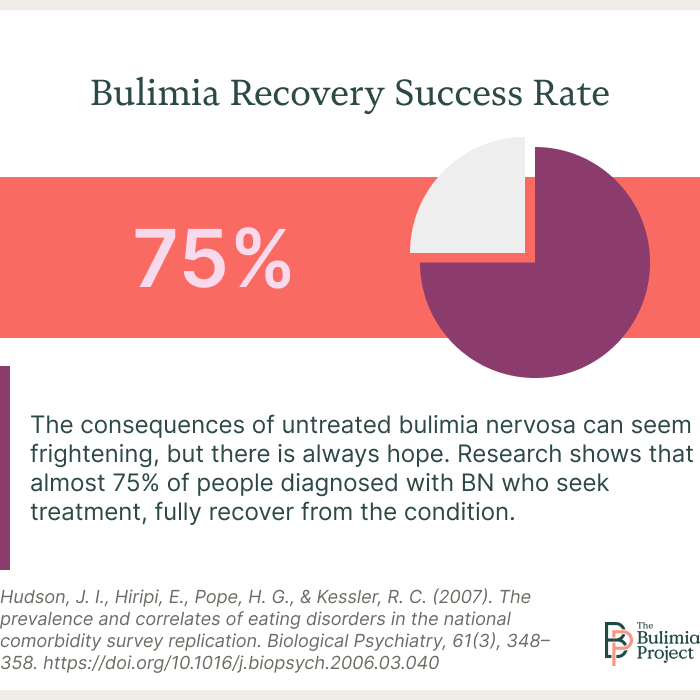
In Summary
Bulimia nervosa (BN) is a serious eating disorder that’s characterized by a cycle of binging and purging or compensating. Put simply, a person regularly eats a large amount of food (more than usual) in a single sitting and then attempts to compensate by self-induced vomiting, excessively exercising, fasting, and/or using diuretics and laxatives.
This eating disorder typically manifests in late childhood and early adulthood and is believed to affect 0.5% to 1.5% of the population. However, the prevalence may be higher due to the secrecy and shame accompanying the condition (1).
If you’ve noticed that your attitudes and behaviors towards food and yourself have changed, and not in a positive way, it can be a worrying experience.
If you’re becoming secretive over your eating habits, eating large quantities of food in a single sitting, purging after meals, and finding your self-worth is increasingly linked to how you see or feel about your body, you may be suffering from bulimia nervosa.
We know that there is a lot of shame and guilt that can accompany the disordered eating behaviors associated with BN and this can make it difficult to admit that there is a problem. However, if you ignore or downplay the seriousness of an eating disorder your physical and mental health could suffer in the long run.
If you think you have a problem with bulimia nervosa or any other eating disorder, it’s important that you try to speak up to someone you know or to your healthcare provider. This is the first important step on the journey to getting the help and support you need.
Resources
- Hudson, J. I., Hiripi, E., Pope, H. G., & Kessler, R. C. (2007). The prevalence and correlates of eating disorders in the national comorbidity survey replication. Biological Psychiatry, 61(3), 348–358. https://doi.org/10.1016/j.biopsych.2006.03.040
- Bulimia nervosa. National Eating Disorders Association. (2018, February 22). Retrieved July 12, 2022, from https://www.nationaleatingdisorders.org/learn/by-eating-disorder/bulimia
- WebMD. (n.d.). Bulimia: Symptoms, treatments, and prevention. WebMD. Retrieved July 12, 2022, from https://www.webmd.com/mental-health/eating-disorders/bulimia-nervosa/mental-health-bulimia-nervosa
- Pietrangelo, A. (2019, March 15). The effects of bulimia on your body. Healthline. Retrieved July 12, 2022, from https://www.healthline.com/health/bulimia/effects-on-body
- Cotton, M. A., Ball, C., & Robinson, P. (2003). Four simple questions can help screen for eating disorders. Journal of general internal medicine, 18(1), 53–56. https://doi.org/10.1046/j.1525-1497.2003.20374.x
